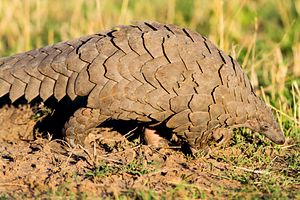Across the globe, Valentine’s Day often means a combination of chocolate, flowers and a romantic dinner. In the town of Machap Baru, in Malaysia’s Malacca state, restaurants intent on providing a once-in-a-lifetime dining experience were shut down after authorities found endangered animals on special Valentine’s Day dinner menus.
Chinese-majority Machap Baru made its mark on tourist maps in the 1980s after local restaurants began serving exotic game. Deer, wild boar and frogs are perhaps three of the least unusual, non-endangered species that can be eaten there. The truly adventurous can dine on various kinds of snakes, turtles and salamanders. Even anteater – an animal that is considered threatened, but not yet endangered – is on the menu in some establishments.
According to The Star, enforcement officers from the National Parks and Wildlife Department (Perhilitan) raided three Machap Baru eateries on the afternoon of February 14, seizing “numerous packets of near-extinct wildlife meat and several live species.”
At just one of the restaurants, authorities discovered 27 packets of flying fox meat, 12 packets of civet meat, and four packets each of macaque and river terrapin meat.
Many of the 173 known species of flying fox, also known as fruit bats, are endangered. The Malaysian flying fox, Pteropus vampyrus, is the world’s largest – with a wingspan that can reach up to five and a half feet. Although they physically resemble ordinary bats, fruit bats use sight and smell to navigate, rather than echolocation.
“In many countries where fruit bats and man coexist, the practice of hunting and eating bats is a common and entrenched custom,” said the Flying Fox Conservation Fund. “Some communities believe eating fruit bats can cure such ailments as asthma and kidney complaints. Fruit bats can be found for sale dead or live in markets or by street vendors in Indonesia, Malaysia and Africa.”
Adding to the plight of the flying fox is the fact that most species give birth to a single offspring only once a year.
Civets, often wrongly referred to as civet cats, are actually close relatives of the mongoose. Because a civet’s diet is based almost entirely on fruit, civet meat is coveted for its sweet taste. Pheromones extracted from the civet’s perianal gland have also contributed to its declining numbers – until 1998, Chanel used civet pheromones as a major ingredient in the company’s world famous “No. 5” perfume.
As if being barbecued and turned into eau de toilette wasn’t bad enough, some species of civet reached endangered status after a SARS outbreak in mainland China was attributed to the consumption of tainted civet meat.
Vincent Low, the chairman of the Malacca Society for the Prevention of Cruelty to Animals, said that endangered and at-risk animals continue to appear on dining menus because of the belief that – as in the case of the fruit bat – such dishes possess medicinal qualities.
“Some believe that stewed river terrapins cure cancer, civet cats relieve asthma and pangolin scales regulate menstruation,” Low explained. “I think the dishes that were to be served on Valentine’s Day supposedly had aphrodisiac values. It is believed that the wilder the animal, the better its curing effects are for a particular illness.”
Perhilitan agents raided a Kuala Lumpur restaurant last summer, confiscating bear’s feet, tapir’s nose, and pangolin scales – a likely indication that demand for exotic fare is spreading. Four similar raids also took place in Kedah in 2013.
The otherworldly looking pangolin – which resembles a small, scaly anteater – has been called “the new rhino” of the illegal wildlife trade.
“The scales are made of keratin, the same substance as a rhino horn or human nails, and are ground into traditional medicine-believed to ‘cure’ various diseases,” wrote conservationist Prerna Singh Bindra. “The meat of the pangolin is a delicacy too and commands a lucrative price, primarily in Southeast Asia, [where it] is served on the plates of the rich as a status symbol.”
TRAFFIC, the wildlife trade monitoring network, said that pangolins are the most commonly seized animal in Southeast Asia.
Despite widespread belief that pangolin scales and other endangered animal products can cure diseases or improve health, there is no scientific evidence to support such claims.
“These foods don’t have the mystic properties claimed. Comparing the nutritional values of domestic fowl and livestock with wild animals we found identical quantities of protein, carbohydrates, fats and other nutrients,” said Zheng Jianxian, a food scientist at South China University of Technology. “There is no special nutritional value or particular benefit.”



































